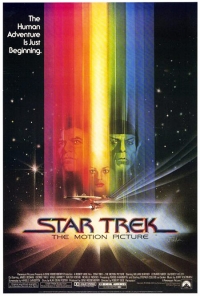Mike Matessino: Star Trek: The Motion Picture was itself a milestone in cinema and there are a lot of obvious reasons why it’s worthy of celebration… it was the first successful leap of a television property to the big screen and it re-launched a franchise that continues to this day, and so forth… but I would take it a step further and say that the movie is more relevant now than it ever was. Visually it really holds up and I think it is appreciated more now for bringing a scope and majesty to the Star Trek universe that, arguably, was never again sustained on this grand a scale.
Michael Okuda: Star Trek: The Motion Picture is more than a motion picture. It is the culmination of the dream of all of us Star Trek fans who loved the original series. Of everyone whose heart sank when the original series was cancelled, and who spent the next decade wishing that somehow, our friends on that fabulous starship could come back and we could go with them on another voyage into the unknown.
Denise Okuda: When we watch ST:TMP, we still feel an echo of that thrill, that moment of triumph when this movie that we wanted so very much, for which we waited for so very long, finally came to the screen. So for us, it is very much worthy of celebration, not only as a cinematic achievement, but for very personal reasons.
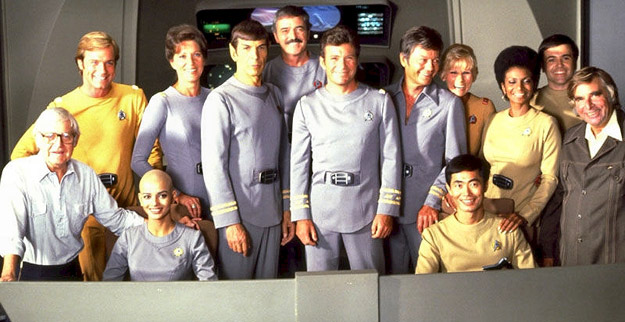
Coate: When did you first see Star Trek: The Motion Picture and what was your reaction?
Altman: I first saw Star Trek: The Motion Picture opening day on December 7, 1979. Much as depicted in my film Free Enterprise, I raced from junior high school with two friends, Kevin Costello and Richard Gallo, to the Georgetown Theater in Brooklyn (now a Party City apparently) only to be denied entrance to the G-rated movie by an over-earnest box-office attendant who told me children under 16 were no longer allowed in the theater unaccompanied by an adult after 4pm due to a recent “incident” (whatever the hell that meant). After telling her I was related to Robert Altman (I wasn’t, by the way) and looking at her befuddled reaction, I was forced to explore alternate options of admittance as there was no way I was going to miss seeing ST:TMP on opening day. Realizing my mother would be at the Brooklyn Savings Bank to deposit her paycheck after work, I rushed there at warp speed and convinced her to take my friends and me to the movie, which she did reluctantly under duress. It’s hard for those who grew up on the film in home video to understand what it was like sitting in a theater in 1979 and finally seeing Star Trek return after incessant delays, false starts and dashed hopes and dreams. To look up at a massive theater screen as the overture began and the curtains parted was no less a miracle than the parting of the Red Sea as the words Star Trek appeared writ large on the silver screen and Jerry Goldsmith’s stunning and now indelible theme music began to play. And in a moment that can only be described as sheer ecstasy, the Klingon theme started to play and a Klingon cruiser is revealed in battle against a mysterious entity. More than any other moment in cinema, this may be the ultimate high in nearly five decades of watching Star Trek. That said, one was abundantly aware of the film’s flaws, even at the time, the often lethargic pace, the lack of humor, the disappointing similarity to The Changeling. And yet, it was hard to see the film as a disappointment. The familiar trappings were all there, the ship never looked better, Kirk was in command with Spock and McCoy, ultimately, at his side. The biggest worry fans seemed to have was what if this is it? What if the inflated costs and savage reviews were the death knell for Star Trek? Is there nothing more? Is this all that I am? The answer, of course, was not by a longshot.
Bond: To be perfectly honest, it was possibly the most disappointing movie experience of my life, and that’s due to the end result of what the film was and the level of anticipation it created. Star Wars, for example, probably had more impact for people of my generation than any movie, and part of that was because it came as a complete surprise—it seemed to come out of nowhere and completely change the way we looked at movies. Star Trek, on the other hand, was arguably the most highly-anticipated movie since Gone With the Wind, and there was probably no way it could meet the expectations people had for it. It was made at the height of original Trek fandom, and people followed its development, from something that was going to be directed by Philip Kaufman to a new Star Trek TV series and finally to what became Star Trek: The Motion Picture—we were devouring monthly updates in Starlog magazine, reading teaser pieces in Time magazine, and I think people really expected it to be the greatest science fiction movie ever made. I remember I had to drive out of state to see it with friends, and during the first 15 minutes I was just in heaven, blown away by the scope of the visual effects and Jerry Goldsmith’s magnificent score, and then the whole thing settled down into one long scene on this gray, colorless bridge peopled by crewmen in gray uniforms. It seemed a rehash of plots from the TV episodes, the visual effects, after the well-publicized meltdown from Robert Abel’s visual effects department, seemed, as Gene Siskel pointed out, just like very simple copies of effects done better in Star Wars and Close Encounters. And it just seemed to miss the dramatic fire, the action and fun that a lot of us remembered from the TV series. Now I can admire its ambition and a lot of elements of its production, but it just lacked the excitement of Star Trek for me, and it was a precursor of what Gene Roddenberry’s vision of Star Trek was about to become in Star Trek: The Next Generation, which was a far more reserved and bland utopia than you saw on the original series.
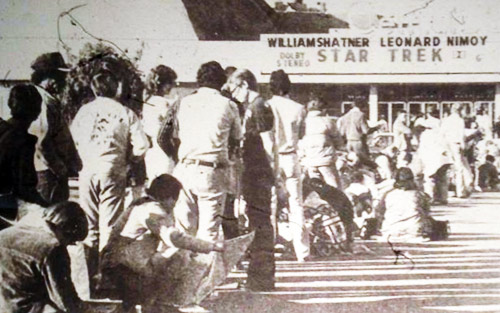
Bulk: The first time I saw it I was three years old. It was during the original release at the Cherry Hill Mall in Cherry Hill, New Jersey. I didn’t have much of a reaction as I was much too young to appreciate it, but I remember seeing it there. It was only years later (when I was helping you with some research, Mike) that I confirmed that it did play in that theater and my memory wasn’t playing tricks on me.
Burnett: I saw the very first show of TMP in the John Danz Theater in Bellevue, Washington. I was 12 years old and I’d counted down the days to the opening for the better part of a year. The film blew me away. I loved everything about it... but most of all, the film felt important. I loved the film’s scope, showing us 23rd Century Earth for the first time and providing glimpses into the Trek universe outside the perspective of our main characters, with the Klingon attack opening, the scenes on the Epsilon 9 station and Spock’s time on Vulcan away from the Enterprise. These were simply revelatory. It was a serious film... and as I moved into my teenage years, I was pretty serious about my own life, so I very much appreciated the film’s tone. Unlike many of the film’s detractors, I had absolutely no problem with the pacing or the lack of the franchise’s more... entertaining elements, such as Tribbles or Gorns. Sure, the plot may have resembled The Changeling, but V’Ger’s sheer size suggested The Universe itself... and the Klingons finally seemed a formidable force. When they were vanquished so easily, the audience knew there was a real danger. All bets were off. To me, TMP’s seriousness evoked some of my favorite episodes of the series, such as The Immunity Syndrome, The Doomsday Machine, Balance of Terror or The Tholian Web.
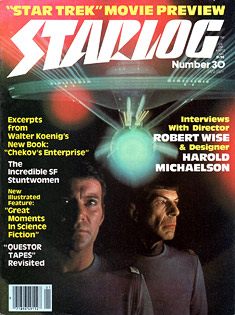 Dochterman: I was there on opening weekend. On Sunday, December 9th at around 3 in the afternoon. I was 12 years old, and had already been primed by several articles in Starlog magazine and Scholastic magazines at school. I was very excited. I had been a Star Trek fan since 1973 and my first exposure to The Animated Series got me interested in the live-action re-runs. Channel 11, WPIX in New York, ran the original series every night and I had audiotapes of several of my favorite episodes that I had committed to memory. I saw the film and loved it… as it was. Warts and all. I had no conception that it had been rushed to completion, with a minimal sound mix, and no fine cut. No inkling that the visual effects had been rushed into a kamikaze eight-month schedule. And no clue that it was a truly troubled production. Instead it showed me my heroes again. In a setting that I could only describe as “real”… It convinced me totally. And in my eyes, it was never to be that grand again in a movie.
Dochterman: I was there on opening weekend. On Sunday, December 9th at around 3 in the afternoon. I was 12 years old, and had already been primed by several articles in Starlog magazine and Scholastic magazines at school. I was very excited. I had been a Star Trek fan since 1973 and my first exposure to The Animated Series got me interested in the live-action re-runs. Channel 11, WPIX in New York, ran the original series every night and I had audiotapes of several of my favorite episodes that I had committed to memory. I saw the film and loved it… as it was. Warts and all. I had no conception that it had been rushed to completion, with a minimal sound mix, and no fine cut. No inkling that the visual effects had been rushed into a kamikaze eight-month schedule. And no clue that it was a truly troubled production. Instead it showed me my heroes again. In a setting that I could only describe as “real”… It convinced me totally. And in my eyes, it was never to be that grand again in a movie.
Fein: I first saw Star Trek: The Motion Picture when I was a kid growing up in Staten Island, New York. My father took me to see the film at the Lane Theater and the experience was absolutely breathtaking and awe-inspiring. I was captivated by seeing my childhood television heroes on the big screen… especially Kirk and his heroine… The Enterprise. I was in heaven when Scotty took us… err… Kirk around her to marvel at the refit lines and curves. It wasn’t until the original Enterprise model arrived at Foundation Imaging for The Director’s Edition that I remembered how thrilling that childhood moment captured my imagination. Once again, I travelled over every inch of the model studying every detail. It was magical.
Mantz: I saw TMP on its opening weekend, but on a Saturday, so that would have been December 8th, at the Leo Mall in Northeast Philadelphia. I had already been a diehard Trekker (or Trekkie, as we were still called in those days), and I watched Star Trek every night at 7pm on Channel 17. Of course I was blown away by Star Wars, and I loved Battlestar Galactica, but the original Star Trek was and still is my favorite TV show of all time…. I answered a lot of this in [the first question], but the thing that struck me the most was the music. Goldsmith could have gone the John Williams/Star Wars route, but he went in another direction, which is why it still holds up. The opening credits theme and the love theme are among the most beautiful scores ever composed for the big screen.
Matessino: I cut school and saw TMP at the first show on opening day. I loved it from the outset because it was just so amazing to see the Star Trek characters and the Enterprise on the big screen. There was, of course, a sense that it wasn’t a rip-roaring action picture like Star Wars, but nevertheless I was completely mesmerized by the whole idea of a sophisticated spaceship heading out to attempt contact with a potentially deadly alien intelligence. I’ll even admit that two-and-a-half years later, I came out of seeing Star Trek II feeling, as I still do, that it’s a terrific movie but that I still liked TMP better.
D. Okuda: We both saw it on opening day, although we didn’t know each other at the time, and we saw it in different cities. My overwhelming reaction, and Mike’s too, was joy that the film had been made.
M. Okuda: I think we each saw it as almost a personal vindication that something we loved so much had come back in such a spectacular fashion. Still, there’s no denying that the film doesn’t quite capture the drama, the excitement, or the sense of family that we loved so much about the original series.
Coate: How is Star Trek: The Motion Picture significant within the science-fiction/fantasy genre?
Altman: Star Trek: The Motion Picture was the last gasp of more cerebral sci-fi storytelling. Although it was released two years after Star Wars, ST:TMP owed far more to 2001: A Space Odyssey than it ever did to Star Wars. It was not space opera, it was science fiction. Star Trek influenced Star Wars in a way that Star Wars never influenced Trek. (Other than the dreadful bar scene in Star Trek III.) George Lucas has admitted to being a fan, and you can see Trekkian conceits (deflector shields, cloaking devices, etc.) amongst the trappings of the serials, Westerns and Kurosawa. If anything, we can blame Star Wars for killing Star Trek: Phase II, Paramount’s plan to revive the television series as a 13-episode sequel for its aborted fourth network, which had itself killed Philip Kaufman’s previous attempt to do a heady Trek motion picture, Planet of Titans, a Spock-centric mind-fuck in which the Enterprise crew would eventually be revealed as the Titans of ancient myth. Other than John Dykstra, there’s nothing of Star Wars in Star Trek: The Motion Picture, which is probably why it proved to be such a disappointment to so many people who were expecting space dogfights and witty banter. Both of which they would get in the sequel. Ultimately, Trek would have been better served by the TV series because Star Trek is a television show, it’s steeped in character or as Nicholas Meyer once said, it’s a radio show, not ideally suited to cinema. When you try to make it a movie, you end up with what J.J. Abrams did: delicious eye candy which are empty calories. Missing the message and metaphor at the heart of great Star Trek, but enjoyably entertaining romps nonetheless.
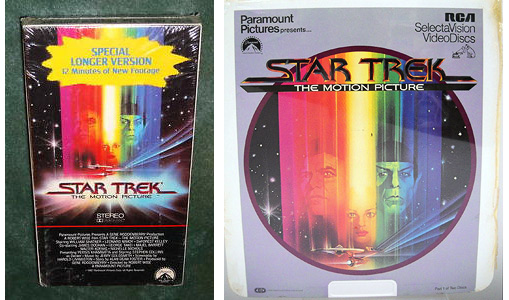
Bond: I think primarily in re-establishing this franchise and giving it a visual look that could be accepted by audiences into the 1980s, 1990s and beyond.
Bulk: It is a big epic-scale production that doesn’t devolve into fist fights or laser battles. I enjoy those things, but TMP came out as a response to Star Wars and it could have easily gone the “shoot ‘em up” route. The fact that it doesn’t is something to appreciate.
Burnett: TMP, like Forbidden Planet, 2001, Close Encounters and Alien before it, celebrates the wonders and mysteries of the Universe itself. However you feel about the film, TMP evokes the same kind of genuine awe we felt seeing the Krell Labs for the first time. The scope and size of V’Ger, the ultimately prescient storyline of the coming Singularity and Spock’s realization of the value of emotion are huge ideas, the very core of classical science fiction. How refreshing after the swashbuckling reductive nature of Star Wars fantasy, with planets nothing more than foreign lands. TMP brought audiences to a point where big questions about the nature of humanity and its place in the cosmos were being asked, questions bigger than even those in The Original Series itself. Thirty-five years later, TMP still remains probably the best illustration of Ray Kurzweil’s ideas about Singularity ever committed to film. Spock relating V’Ger’s central question, “Is this all that I am? Is there nothing more?” gives me chills every time.
Dochterman: The number of popular culture events that can be classified as “true science-fiction” can be counted on one hand. With all the cultural explosions that Star Wars ignited, Star Trek was both a progenitor and a descendant of it. Never again would Star Trek adventures have the emphasis on science fiction… they would later be transformed into more of an action adventure space fantasy mode. For “purists,” of which I count myself as one, TMP was the great experiment. It’s debatable whether or not the later installments are as high targeted as the intent for TMP. Though it is constantly reported as a “big lumbering failure” by some revisionists, TMP was a very successful film. So much so, that it was able to carry the burden of ten years of development and holding costs that were incurred by the studio for several movie attempts, and an almost gestated Phase II television series. All of those costs were folded into the budget of TMP, perhaps unfairly. Still, it was a blockbuster in its day. Though Trek II: The Wrath of Khan sold slightly more tickets quicker than its predecessor, it created a take on the world that was subtly smaller, and less wondrous. The second film and the sequels do give a bigger “bang” at the end to let the audience know when to clap… but it doesn’t merit a place in the pantheon of great science fiction with 2001: A Space Odyssey and Forbidden Planet… both influences on TMP.
Fein: The creative and financial success of the film made it the anchor point from which everything Star Trek evolved. I’m clearly not discounting the original series—I appreciate the way The Motion Picture elevated the property and opened the many new doors for the franchise. It was the first true theatrical “revival” of a television series, and would forever inspire the future of the science fiction genre.
Mantz: Last summer, it was reported that Voyager 1 finally left the outer reaches of our solar system for interstellar space. That made me think of ST:TMP—that someday, maybe tens of thousands of years from now, an alien intelligence could find our little Voyager and evolve it enough to be a sentient being. I know a lot of Trekkers who had that same reaction. It is pure sci-fi, but who knows, maybe it’ll happen.
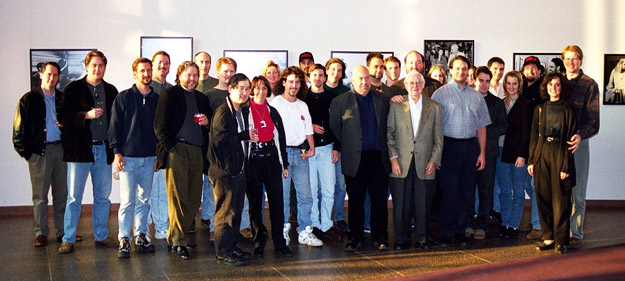
Matessino: I feel that Star Trek: The Motion Picture remains extremely important as a piece of science-fiction cinema for the simple reason that we really have not had too many true science-fiction films. Star Wars was a fantasy that utilized common science-fiction tools like spacecraft and lasers, but it was so popular that this became the template for most of what was to come, and we can even see the impact of that on the Star Trek feature films that followed. What TMP did was demonstrate that the characters and the basic premise of Star Trek could hold their own in a 2001: A Space Odyssey-like story. It completely broke the bonds of what had been considered a campy ‘60s TV show by some and showed that the basic idea was capable of much more than that. In and of itself I feel that TMP addresses a lot of very important issues about our relationship with technology and what it will take for humanity to be truly worthy of going out into space and confronting the unknown. Along with The Day the Earth Stood Still, 2001 and Close Encounters of the Third Kind, I feel it’s a “must-see” movie for the true science-fiction aficionado.


